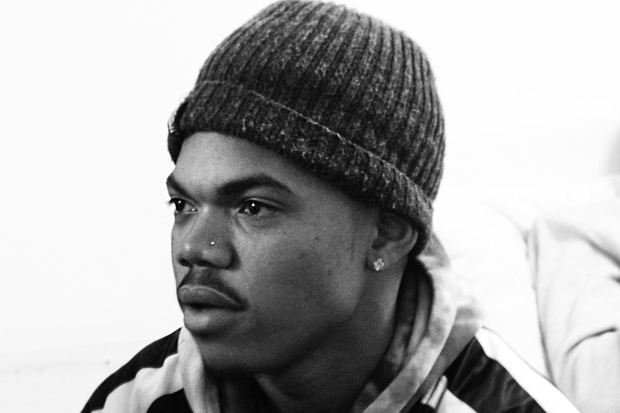Release Date: April 30, 2013
Label: Self-released
There are way too many ideas on Chance the Rapper’s Acid Rap mixtape, but that’s a good thing. Woozy, collage-like tracks don’t stay one way for long, and lyrical conceits are held together by impulsive tangents and “woah, dude” thought experiments. On “Everybody’s Something,” a quasi-romantic though mostly real-talk evaluation of how and why we learn to care for one another, the 20-year-old Chicagoan mentions that God doesn’t seem to answer his calls, imagines Jesus’ Twitter account, wonders if he would even bother to follow that Twitter account, and while you’re catching up with that Web 2.0 faith crisis, reminds you of his hometown’s hallowed blues tradition. Then he zings the Rolling Stones for being mad late on co-opting that stuff.
His new mixtape’s best moments gain their power from such good-idea/bad-idea indulgences and batty risk-taking. Nerdy, nostalgia-soaked highlights “Cocoa Butter Kisses” and “Acid Rain” shout out the color of his old Nickelodeon sing-along cassettes (bright orange) and some of his favorite childhood foods (grilled-cheese sandwiches, cut diagonally). Both tracks are backed by gasping, glowing beats that seem to be eating themselves from the inside. The most thrilling moments, though, come when Chance gets a chance to cartoonishly contort his voice, as on the angular “Juice” and the menacing marching-band freakout “Smoke Again”; Kendrick Lamar’s rubbery cadence comes to mind, but Chance injects plenty of quirk and specificity. On the very good kid, m.A.A.d. city-like “Pusha Man,” he naggingly gargles a schoolyard taunt, suggesting that the shit-talking dealer who think he’s transgressive is really just a petulant child, but the track’s second half diagnoses the brain-fried paranoia that comes with hustling, and affords some sympathy to that very same dealer. Moreover, those two halves are split by almost 20 seconds of complete silence, ratcheting up the tension, and also making it clear that Chance is entirely in control. His music will stop dead for nearly half a minute, if he wants it too.
But then, as if he’s suddenly sobered up and realized he needs to get to the point, Chance unleashes a long rant about Chicago’s crime rate and the resultant media apathy:
They murkin’ kids
They murder kids here
Why you think they don’t talk about it?
They deserted us here
Where the fuck is Matt Lauer at?
Somebody get Katie Couric in here
Probably scared of all the refugees
Look like we had a fuckin’ hurricane here
And we shootin’ whether it’s dark or not
I mean the days, it’s pretty dark a lot
Down here, it’s easier to find a gun than it is to find a fuckin’ parking spot
No love for the opposition
Specifically a cop position
Because they’ve never been in our position
Getting violations for the nation correlating you dry-snitchin’
Such an off-the-rails flow creates the sense that at any moment, a verse — or a full song, or the entire record — could crash and burn and overdose on audacity. It’s the same anything-can-happen intensity that street-rap delivers, just more abstract, with a more worldly-wise sense of what matters. “Good Ass Intro” features the soulful voice of BJ the Chicago Kid alongside five other singers, backed by ghettotech-tinged juke, the wild local dance music that serves as a party-ready analogue for Chance’s delivery: beats as lithe and manic as his raps. There is even a similar, beyond-words sense of escape to both juke dancing and Chance’s free-as-a-bird rapping, where words’ meanings become less important than the meditative, temporarily transcendent qualities of unhinged expression.
Certain kinds of rap jerks will inevitably set up a big dumb binary between Chance — 20 years old, from Chicago’s South Side, and a wordy sing-song scat-rap yammerer; and Chief Keef — 17 years old, from Chicago’s South Side, and a seething sing-song laconic mumbler. But don’t buy into it (Chance even shouts out Keef on “Juice”). There is more than one way to vent your spleen on behalf of your seemingly forever-fucked city, and both approaches are vital. For Chance, it’s an endless burst of wordplay, half-idyllic memories of youth, and sensitive-dude concerns aired out in a voice that invokes the somber squeak of Kendrick Lamar, the I’m-already-a-genius swagger of Kanye West, and a dick-swinging Lil Wayne at his most drugged-out.
It may be frustrating to immediately place him in the context of so many other, more established rappers, but the comparisons are there: Chance is a next-to-the-‘hood, good-kid insider/outsider a little too willing to remind you that he’s a good-kid insider/outsider, and that’s pure Kanye and Kendrick. But at just 19, aspiring to compete with such ambitious rap visionaries, and mostly succeeding, is an impressive feat. Call him the anti-Keef, if it’s the only way to make him matter to you. But more importantly, Chance the Rapper is a wide-eyed talent figuring out the world one deeply felt rap song at a time. That’s why he matters.





